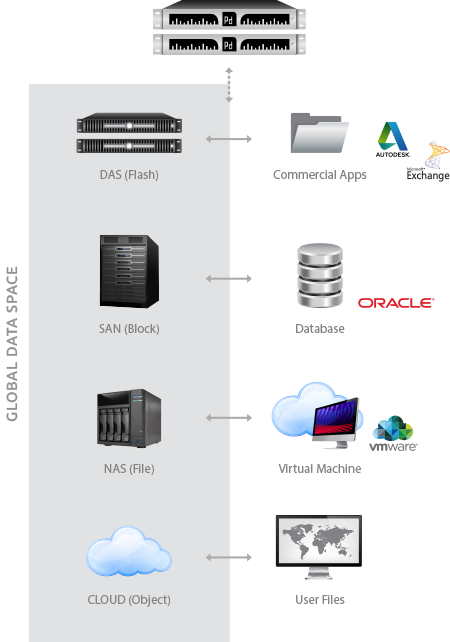Primary Data Contributions Drive Standardization of NFS 4.2
Open standards pNFS and Flex File contributions deliver native support for data virtualization, cross-platform data management and data mobility in DataSphere platform.
This is a Press Release edited by StorageNewsletter.com on December 13, 2016 at 3:03 pmPrimary Data, Inc. announced that its open standards Parallel NFS (pNFS) contributions developed to orchestrate data across different types of storage have been accepted into the NFS 4.2 standard.
Click to enlarge

With NFS 4.2, clients and application servers natively support data virtualization and mobility with company’s DataSphere software platform to meet evolving data performance, cost and protection requirements. Built from firm’s previous NFS contributions, these open standards have been integrated into the Linux OS kernel by Trond Myklebust, principal system architect and Linux NFS client maintainer.
“Simplifying the biggest challenges in storage today – scaling intelligently to support unprecedented growth within limited budgets – is a movement that extends beyond Primary Data into the global open standards community,” said Lance Smith, CEO, Primary Data. “We’re proud to contribute the data virtualization architecture achievements featured in DataSphere as open standards through our NFS engineering team including Trond Myklebust, Tom Haynes and Andros Adamson. By working together, visionaries throughout our industry can contribute to developing open standards that make storage smarter for enterprises around the globe.”
Company’s contributions to NFS 4.2 include enhancements to the Parallel Network File System (pNFS) Flex File layout to allow clients to provide statistics on how data is being used, and the performance provided by the storage resources serving the data. These features are being implemented in the industry, as the recent release of Red Hat, Inc.‘ Enterprise Linux 7.3 platform, features Flex Files support to simplify management of Parallel NFS (pNFS) clusters.
With these NFS contributions, data can be virtualized to become mobile across different types of storage. Service level objectives can be created to ensure that evolving data needs can be automatically matched with different storage resources as business needs change.
Additional enhancements in NFS 4.2 include:
-
Server-side clone and copy enables cloning and snapshots of files by the storage server
-
Application input/output allows applications to inform the storage server of expected I/O behavior
-
Sparse files allows files to be space efficient and use placeholders rather than zeros to improve storage efficiency
-
Space reservation allows storage servers to reserve space without writing data in order to protect against unexpectedly running out of capacity
-
Application Data Block (ADB) enables block on file storage management implementations
-
Labeled NFS enhances security by enabling clients to enforce data access rights
-
Layout enhancements deliver improvements to pNFS capabilities, supporting data mobility and I/O stats per file
“As the world’s most popular open source enterprise OS was even recently embraced by Microsoft, Primary Data is excited to be advancing NFS 4.2 as a new open standard, and integrating these enhancements into the Linux kernel,” said Myklebust. “These contributions deliver support for advanced data management across different storage types, helping to ensure Linux continues to evolve as the most powerful, feature-rich OS available thanks to the work of the global community.“
The DataSphere software platform maximizes enterprise storage performance and efficiency by ensuring the right data is in the right place at the right time. It is a storage-agnostic software platform to virtualize data across a global data space spanning flash, shared and cloud storage across file, block and object protocols.
A policy engine automatically places data on the storage that best meets IT-defined objectives for performance, cost and protection to meet evolving business needs without any application disruption. DataSphere provides native support for the NFS 4.2 standard, simplifying adoption of data virtualization while also enabling interoperability with third-party solutions.
Detailed documentation on company’s contributions and the enhancements to NFS 4.2 approved by the Internet Engineering Task Force can be reviewed at:














 Subscribe to our free daily newsletter
Subscribe to our free daily newsletter

